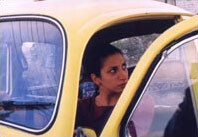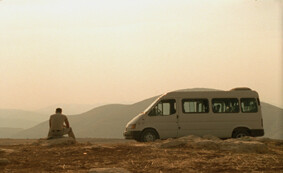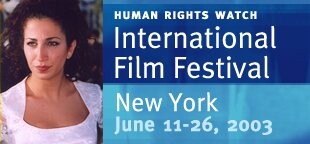12 June 2003

Scene from Rana’s wedding

Scene from Ford Transit

Two films offer perspectives on the after-effects of the violence of the conflict: Israeli filmmaker Yulie Cohen Gerstel’s “My terrorist” is a deeply moving personal account of her search for the Palestinian man who injured her in a 1978 terrorist attack and her need for reconciliation, while “Welcome to Hadassah hospital” takes a startling look at the people who make up Jerusalem’s Hadassah Hospital, where the victims and perpetrators of suicide attacks are often treated side by side. The epic documentary “Kaddim Wind-Moroccan Chronicle” tells the fascinating story of Moroccan Jewry in Israel through the memories of six second generation immigrants to Israel who tell their dramatic personal stories about the process of absorption that was accompanied by racism and oppression.
Also from the Middle East are two compelling dramas: I am Taraneh, 15, tells the story of a teenage girl who, on finding herself pregnant by the fianc� who later deserts her, chooses to keep the baby, while the Iraqi Kurdistan-set Jiyan examines the unfolding relationship between an American Kurd and a young girl orphaned by the chemical bombings in Halabja.
It is particularly timely in light of recent world events that reconstruction and reconciliation in the aftermath of conflict is a prevalent theme in this year’s festival.
Gacaca, living together in Rwanda is a remarkable look at Rwanda’s Gacaca Tribunals, a bold and unique form of citizen-based justice aimed at unifying this country of 8 million after the 1994 genocide which claimed over 500,000 lives in 100 days. The last just man focuses on the Rwandan genocide through the eyes of General Romeo Dallaire, leader of the UN’s 1994 peacekeeping mission, who recounts the horrific events and his guilt at not being able to do more to stop them. When the war is over powerfully explores the after-effects of the South African struggle against Apartheid by focusing on two former teenage guerrillas who are struggling to make a new path in life.
The festival also shines its spotlight on Latin America. In War Takes, three Colombian filmmakers turn their cameras on themselves, using personal stories to expose the tough reality in their violent, war-ravaged country. Pinochet’s Children offers a contemporary perspective on the human rights abuses of Chilean dictator Augusto Pinochet through three former student leaders, two of whom lost their fathers during the 1973 coup. Brazil’s MADAME SATA is a colorful period piece based on the true story of Jo�o Francisco dos Santos, a transvestite cabaret performer and criminal who struggled against oppression to become a popular folk hero. BALSEROS is the story of a group of Cuban refugees who risked their lives on homemade rafts to reach the United States, and how they struggled in the years after their arrival.
Other films of special note are Russia’s 1944-set THE CUCKOO, a farcical anti-war fable that focuses on the unusual relationship between a Russian soldier, a young Finn fleeing a band of Nazis, and the Lapp widow who takes them both as her lover; THE FLUTE PLAYER, an extraordinary documentary that follows musician and activist Arn Chorn Pond back to the “killing fields” of Cambodia where most of his family and 90% of the country’s traditional musicians were killed; DWEEPA, an Indian drama about a rural couple who fight to save their land against the rising waters of a government-constructed dam; STATE OF DENIAL, an intimate look at the AIDS epidemic in South Africa through the lives of six people living with the disease; LIFE ON THE TRACKS, a cinema verit� portrait of a family living near the railway tracks in a Manila shantytown; and SCENES FROM AN ENDLESS WAR, a biting critique of mainstream media after September 11, 2001.
The festival is also pleased to present with MediaRights.org the third annual online Media That Matters Film Festival. For more information go to www.MediaThatMattersFest.org.
General Information:
Except where otherwise noted, all films are screened at the Lincoln Center’s Walter Reade Theater, 165 West 65th St., plaza level. For more information on the Human Rights Watch International Film Festival please visit: www.hrw.org/iff or www.filmlinc.com.
Related Links: